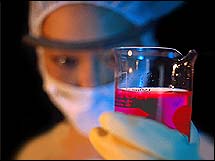House OKs stem-cell bill: 4 stocks to watchHouse passes bill for federal funding of embryonic stem cell research; White House says Bush will veto.NEW YORK (CNNMoney.com) -- The U.S. House of Representatives voted in favor of a bill that would lift President Bush's funding restrictions on research involving embryonic stem cells. But the Democratic-controlled House passed the bill 253-174, less than the two-thirds majority it would need to override a veto from Bush, who vetoed the last bill involving funding for embryonic stem cell research. The Senate has not yet voted on the bill.  In anticipation of today's vote, investor interest in biotech stocks has been whipped up, though biotechs probably wouldn't benefit directly from the funding, even if it's eventually approved. "This is a step in the right direction, but if anyone is buying StemCells Inc. based on this one vote, they need to rethink their priorities," said Steve Brozak, analyst at the investment and research firm WBB, referring to one of the biotechs involved in stem cell research. Proponents of the use of embryonic human stem cells in medical testing say it could hold the secrets to healing people with severed spinal cords, brain damage and other disabling injuries as well as diseases like Parkinson's and Alzheimer's. But the technology is unproven and even if it works, it's years away from producing therapies that can heal patients. It is also years away from potentially generating income for biotech companies. Yet investors have been bidding the stocks higher. Although StemCells Inc. (down $0.08 to $3.35, Charts) stock fell about 2 percent Thursday, the stock's climbed more than 25 percent so far this year. It's the most recognizable name in the industry, analysts say, even though it doesn't stand to benefit directly from the vote. "The stock [StemCells] is probably most tied to political movement, just because of the ticker," said Jose Haresco, analyst for Merriman Curhan Ford & Co., an investment research firm, referring to the company's stock symbol of STEM. "It's almost a perfect barometer." The stock of Aastrom Biosciences (down $0.08 to $1.46, Charts) slumped about 5 percent Thursday, but overall gained about 20 percent this year. Haresco said that StemCells and Aastrom specialize in the use of adult stem cells however, not the ones derived from human embryos, which are the subject of the bill. The stock price for Osiris Therapeutics (down $1.37 to $26.77, Charts), another biotech specializing in adult stem cells, also gained this year, though it slumped about 5 percent in Thursday trading. Geron Corp., (up $0.20 to $8.90, Charts) a biotech developing stem cell technology which is based on human embryos, has been volatile this year and only pulled into the plus column Thursday, when the stock rallied about 2 percent. The stocks, save for Geron, had run up after news of the possible House vote first surfaced last week. "Geron is clearly at the top of the pack," said Brozak of WBB, who rates the company a "strong buy," noting that it is the most advanced in the development of embryonic stem cell technology. Geron's most recent stem cell study involved rats, not people, though a spokesman for the company said early-stage human trials will begin in 2007. "We expect to enter the clinic this year with a human embryonic stem cell-based therapeutic for the treatment of spinal cord injury," said David Schull, spokesman for Geron. Any products would be years away. Still, there has been promising news in this area. In an unrelated study last year, Dr. Douglas Kerr of Johns Hopkins Hospital in Baltimore used experimental stem cell technology to successfully repair lab rats' damaged spines, restoring mobility to their legs. And more recently, U.S. researchers reported that stem cells nearly as powerful as the ones found in embryos could be extracted from fluid that is contained within the amniotic sac, according to Reuters, which could reduce the controversy over stem cell research. Stem cells from embryos, believed to hold the most potential for research, are controversial since they often come from embryos set aside for in vitro fertilization. Even if the bill passes the Senate vote, President Bush is expected to veto it. He shot down a similar stem cell bill last year, in the only veto of his presidency. "The one veto that President Bush put into effect during his presidency was against stem cell advancement, so you have to be practical when you think about what the ramifications are going to be," said Brozak of WBB. Also, scientists in Britain have asked authorities whether they would be permitted to create a hybrid of human and animal embryos for their stem cell research, according to the BBC, which reported that the public will vote on the issue. The analysts quoted in this story do not own shares of company stocks mentioned here. |
|
